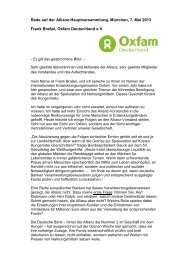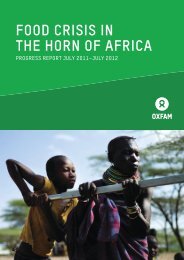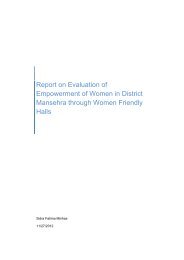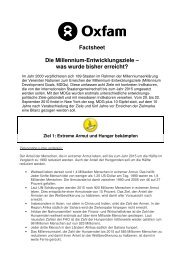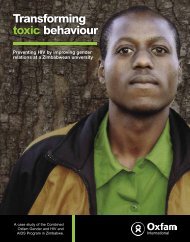Die neue Jagd nach Ressourcen: Wie die EU-Handels- und - Oxfam
Die neue Jagd nach Ressourcen: Wie die EU-Handels- und - Oxfam
Die neue Jagd nach Ressourcen: Wie die EU-Handels- und - Oxfam
Sie wollen auch ein ePaper? Erhöhen Sie die Reichweite Ihrer Titel.
YUMPU macht aus Druck-PDFs automatisch weboptimierte ePaper, die Google liebt.
Seite 50<br />
108 Ebd., S. 64<br />
109 Ebd., S. 25<br />
110 Ha-Joon Chang, Bad Samaritans: The Guilty Secrets of Rich<br />
Nations and the Threat to Global Prosperity, Random House,<br />
London, 2008, S. 99<br />
111 ActionAid, Trade Traps: Why Economic Partnership<br />
Agreements pose a threat to Africa’s development, 2004, S.<br />
23<br />
112 UNCTAD, Trade and Development Report 2007, Genf, 2007,<br />
S. 62<br />
113 UNCTAD, Economic Development in Africa: Rethinking the<br />
Role of Foreign Direct Investment, 2005, S. 20, 22 <strong>und</strong> 65<br />
114 UNCTAD, Bilateral Investment Treaties in the Mid-1990s, UN,<br />
1998; Mary Hallward-Driemier, ,Do Bilateral Investment<br />
Treaties Attract FDI? Only a bit... and they could bite‘, Policy<br />
Research Working Paper Series, August 2003<br />
115 UNCTAD, World Investment Report 2009, Genf, 2009, S. 32<br />
116 Vgl. http://www.unctad.org/sections/dite_pcbb/docs/<br />
bits_brazil.pdf<br />
117 UNCTAD, Economic Development in Africa: Rethinking the<br />
Role of Foreign Direct Investment, 2005, S. 69<br />
118 Ajit Singh, ,How did East Asia grow so fast?: Slow progress<br />
towards analytical consensus‘, UNCTAD Bulletin, Mai 1995,<br />
S. 4–14<br />
119 Myriam vander Stichele <strong>und</strong> Ross Eventon, ,BITs, FDI and<br />
development‘, in Seattle to Brussels Network, <strong>EU</strong> Investment<br />
Agreements in the Lisbon Treaty Era: A Reader, Juli<br />
2010, S. 25–6<br />
120 Justin Yifu Lin <strong>und</strong> Celestin Monga, ,Growth Identification<br />
and Facilitation: The role of the state in the dynamics of<br />
structural change‘, Policy Research Working Paper, World<br />
Bank, Mai 2010, S. 8<br />
121 <strong>Oxfam</strong>, Partnership or Power Play?: How Europe should<br />
bring development into its trade deals with African,<br />
Caribbean and Pacific countries, April 2008, S. 26<br />
122 European Council, Outcome of Proceedings of the Trade<br />
Policy Committee, 22. Januar 2010, S. 3, http://register.<br />
consilium.europa.eu/pdf/en/10/st05/st05667.en10.pdf<br />
123 Myrian vander Stichele, ,How BITs restrict policy space to<br />
prevent or alleviate financial crises‘, in: Seattle to Brussels<br />
Network, <strong>EU</strong> Investment Agreements in the Lisbon Treaty<br />
Era: A Reader, Juli 2010, S. 29. Einschränkungen auf<br />
Kapitalverkehrskontrollen können „<strong>die</strong> finanzielle<br />
Instabilität erhöhen <strong>und</strong> … Maßnahmen verhindern, <strong>die</strong><br />
unternommmen werden könnten, solche Instabilitäten zu<br />
verhindern. Zahlreiche Maßnahmen, <strong>die</strong> Malaysia während<br />
der Finanzkrise von 1997 bis 1999 erfolgreich eingesetzt hat,<br />
wie zeitliche Beschränkung des Kapitalabzugs, würden<br />
beispielsweise nur unter Schwierigkeiten eingeführt<br />
werden können oder gar verboten sein.“, UNCTAD, Trade<br />
and Development Report 2007, Genf, 2007, S. 61<br />
124 Rede an der University of Manchester, 22. Juni 2010<br />
125 <strong>Oxfam</strong>, Partnership or Power Play?: How Europe should<br />
bring development into its trade deals with African,<br />
Caribbean and Pacific countries, April 2008, S. 27<br />
126 UNCTAD, World Investment Report 2009, Genf, 2009, S. 34<br />
127 Sarah Anderson et al., Mining for Profits in International<br />
Tribunals: How Transnational Corporations use trade and<br />
investment treaties as powerful tools in disputes over oil,<br />
mining and gas, Institute for Policy Stu<strong>die</strong>s, April 2010, S. 1.<br />
Für ICSID Fälle, siehe http://icsid.worldbank.org/ICSID/FrontS<br />
ervlet?requestType=CasesRH&actionVal=ListCases<br />
128 Siehe ,Bolivia takes action against ICSID‘, http://www.art-us.<br />
org/content/bolivia-takes-action-against-icsid<br />
129 Fernando Diaz, ,Pan American Energy takes Bolivia to ICSID<br />
over nationalisation of Chaco Petroleum‘, Investment Treaty<br />
News, 11. Mai 2010<br />
130 EC, DG Trade, ,Q&A: Commission launches comprehensive<br />
European investment policy‘, 7. Juli 2010, http://trade.ec.<br />
europa.eu<br />
131 Ebd.<br />
132 Corporate Europe Observatory, ,The Corporate Investment<br />
Agenda‘, in: Seattle to Brussels Network (ed.), Reclaiming<br />
Public Interest in Europe‘s International Investment Policy.<br />
<strong>EU</strong> Investment Agreements in the Lisbon Treaty Era: A<br />
Reader, 2010, S. 14 ff.<br />
133 Brief von BusinessEurope an den <strong>Handels</strong>kommissar der <strong>EU</strong>,<br />
Karel de Gucht, 4. Mai 2010; durch den Zugang zu<br />
Dokumenten unter der Richtlinie zur Weitergabe von<br />
Informationen erhalten.<br />
134 Corporate Europe Observatory, ,The Corporate Investment<br />
Agenda‘, in: Seattle to Brussels Network (ed.), Reclaiming<br />
Public Interest in Europe‘s International Investment Policy.<br />
<strong>EU</strong> Investment Agreements in the Lisbon Treaty Era: A<br />
Reader, 2010, S. 14 ff.<br />
135 Brief von BusinessEurope an den <strong>Handels</strong>kommissar der <strong>EU</strong>,<br />
Karel de Gucht, 4. Mai 2010; durch den Zugang zu<br />
Dokumenten unter der Richtlinie zur Weitergabe von<br />
Informationen erhalten.<br />
136 UNCTAD, Trade and Development Report 2007, Genf, 2007,<br />
S. 61<br />
137 Ministerielle Erklärung der Afrikanischen Union zu den<br />
EPA-Verhandlungen, Kairo, Juni 2005, http://www.bilaterals.<br />
org/spip.php?article2609<br />
138 Zitiert in: Christian Aid et al., EPAs and Investment, Oktober<br />
2006, S. 23<br />
139 West-Africa-European Community, EPA Negotiations,<br />
Technical meeting, Joint Report, Brussels, 20.–23. April 2009,<br />
zitiert in: ,Critical Issues in the EPA Negotiations: An <strong>EU</strong> CSO<br />
Discussion Paper‘, August 2009, www.epawatch.eu<br />
140 Zitiert in: Traidcraft, Economic Partnership Agreements:<br />
What MEPs need to know, August 2009, S. 4<br />
141 EC, DG Trade, Work Programme and Main issues for the 133<br />
Committee in the Second Half of 2006, 6. Juli 2006<br />
142 SADC Framework proposal, März 2006 <strong>und</strong> EC Staff<br />
Working Document SEC (2006)1427, Para. 25, zitiert in:<br />
Tearf<strong>und</strong> et al., Partnership Under Pressure: An Assessment<br />
of the European Commission’s Conduct in the EPA Negotiations,<br />
Mai 2007, S. 18<br />
143 <strong>Die</strong> Kommission erklärte den <strong>Handels</strong>ministern/innen der<br />
Pazifikstaaten im Juli 2007 beispielsweise, dass 26 Prozent<br />
der regionalen Hilfsmittel nicht bereitgestellt würden,<br />
wenn das Abkommen keine Bestimmungen zu Investitionen<br />
oder anderen „<strong>neue</strong>n“ Themen enthalten sollte. SOMO<br />
and Traidcraft, ACP Regionalism: Thwarted by EPAS and<br />
interim agreements on services and investment, Oktober<br />
2007, S. 4. Der überparteiliche Ausschuss für internationale<br />
Zusammenarbeit in Großbritannien erklärte, er sei besorgt,<br />
dass <strong>die</strong> <strong>EU</strong> ihre Verhandlungsposition mit den AKP-Staaten<br />
ausnutze, um sie zu Verhandlungen über <strong>neue</strong> Themen zu<br />
überreden <strong>und</strong> dass Strafen angedeutet würden, sollte <strong>die</strong>s<br />
abgelehnt werden. House of Commons, International<br />
Development Committee, ,<strong>EU</strong> Development and Trade<br />
Policies: An Update‘, Fifth Report of Session 2006–07, 6.<br />
März 2007<br />
144 Siehe z. B. EcoNews Africa, SEATINI and Traidcraft, Economic<br />
Partnership Agreements: Building or Shattering African<br />
Regional Integration, Mai 2007, S. 42–43; SOMO <strong>und</strong><br />
Traidcraft, ACP Regionalism: Thwarted by EPAS and interim<br />
agreements on services and investment, Oktober 2007, S. 20<br />
145 Critical Issues in the EPA Negotiations: An <strong>EU</strong> CSO Discussion<br />
Paper, August 2009, www.epawatch.eu<br />
146 Thomas Westcott, ,Investment provisions and commitments<br />
in the CARIFORUM-<strong>EU</strong> EPA‘, Trade Negotiations Insights,<br />
November 2008<br />
147 EC, CARIFORUM-EC EPA: Investment, Oktober 2008, http://<br />
trade.ec.europa.eu/doclib/docs/2008/october/tradoc_140979.<br />
pdf<br />
148 <strong>Oxfam</strong>, Partnership or Power Play?: How Europe should<br />
bring development into its trade deals with African,<br />
Caribbean and Pacific countries, April 2008, S. 29<br />
149 Der Text steht auf: http://www.bilaterals.org/spip.<br />
php?article17138<br />
150 Justice for Colombia et al., Trading Away Human Rights:<br />
Why the <strong>EU</strong>-Colombia Free Trade Agreement is a Step in<br />
the Wrong Direction, 2010, Kapitel 2<br />
151 Siehe insbesondere www.farmlandgrab.org<br />
152 ActionAid, Meals per Gallon: The impact of Industrial<br />
Biofuels on People and Global Hunger, Januar 2010, S. 3<br />
153 Siehe Corporate Europe Observatory, Trade Invaders: How<br />
Big Business is Driving the <strong>EU</strong>-India Free Trade Negotiations,<br />
September 2010, S. 35. Siehe auch Roopam Singh <strong>und</strong> Ranja<br />
Sengupta, The <strong>EU</strong> India FTA in Agriculture and Likely<br />
Impact on Indian Women, Heinrich-Böll-Stiftung, Dezember<br />
2009


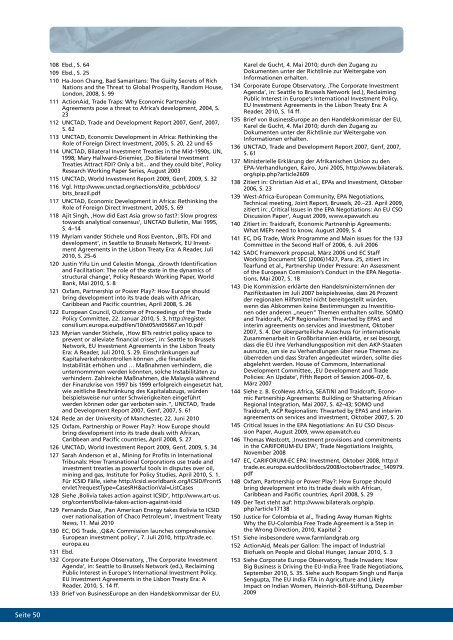

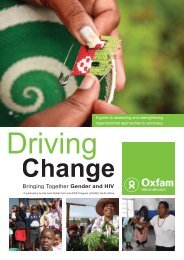
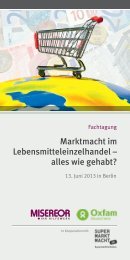
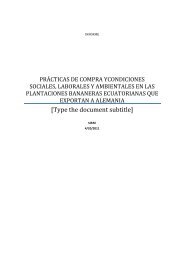
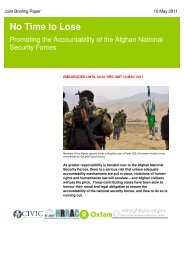
![Download: Faltposter EU-Handelspolitik [PDF 2,17MB] - Germanwatch](https://img.yumpu.com/25095854/1/190x161/download-faltposter-eu-handelspolitik-pdf-217mb-germanwatch.jpg?quality=85)
